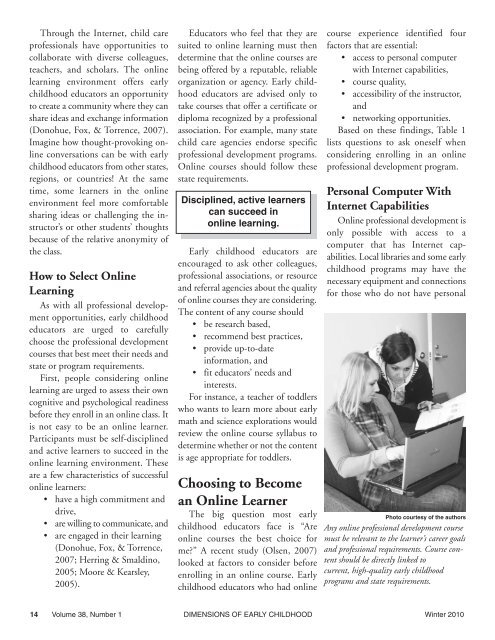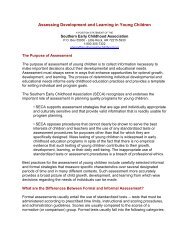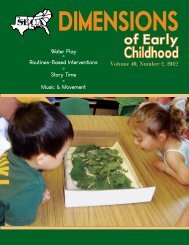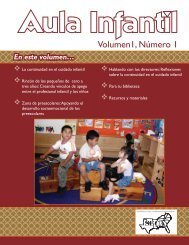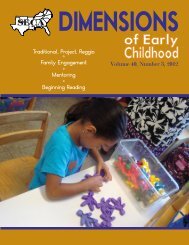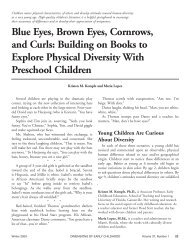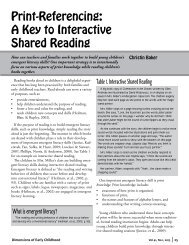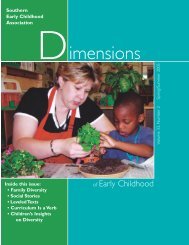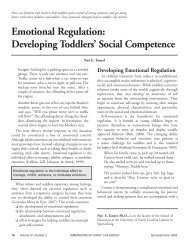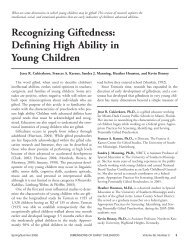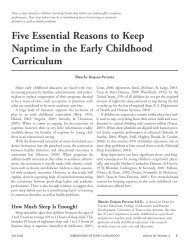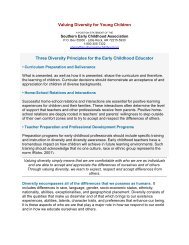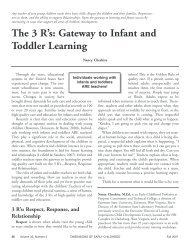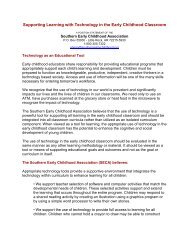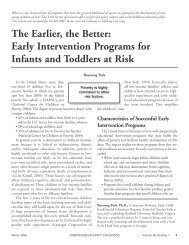90223 Dimensions Winter 10:Layout 1 - Southern Early Childhood ...
90223 Dimensions Winter 10:Layout 1 - Southern Early Childhood ...
90223 Dimensions Winter 10:Layout 1 - Southern Early Childhood ...
Create successful ePaper yourself
Turn your PDF publications into a flip-book with our unique Google optimized e-Paper software.
Through the Internet, child care<br />
professionals have opportunities to<br />
collaborate with diverse colleagues,<br />
teachers, and scholars. The online<br />
learning environment offers early<br />
childhood educators an opportunity<br />
to create a community where they can<br />
share ideas and exchange information<br />
(Donohue, Fox, & Torrence, 2007).<br />
Imagine how thought-provoking online<br />
conversations can be with early<br />
childhood educators from other states,<br />
regions, or countries! At the same<br />
time, some learners in the online<br />
environment feel more comfortable<br />
sharing ideas or challenging the instructor’s<br />
or other students’ thoughts<br />
because of the relative anonymity of<br />
the class.<br />
How to Select Online<br />
Learning<br />
As with all professional development<br />
opportunities, early childhood<br />
educators are urged to carefully<br />
choose the professional development<br />
courses that best meet their needs and<br />
state or program requirements.<br />
First, people considering online<br />
learning are urged to assess their own<br />
cognitive and psychological readiness<br />
before they enroll in an online class. It<br />
is not easy to be an online learner.<br />
Participants must be self-disciplined<br />
and active learners to succeed in the<br />
online learning environment. These<br />
are a few characteristics of successful<br />
online learners:<br />
• have a high commitment and<br />
drive,<br />
• are willing to communicate, and<br />
• are engaged in their learning<br />
(Donohue, Fox, & Torrence,<br />
2007; Herring & Smaldino,<br />
2005; Moore & Kearsley,<br />
2005).<br />
Educators who feel that they are<br />
suited to online learning must then<br />
determine that the online courses are<br />
being offered by a reputable, reliable<br />
organization or agency. <strong>Early</strong> childhood<br />
educators are advised only to<br />
take courses that offer a certificate or<br />
diploma recognized by a professional<br />
association. For example, many state<br />
child care agencies endorse specific<br />
professional development programs.<br />
Online courses should follow these<br />
state requirements.<br />
Disciplined, active learners<br />
can succeed in<br />
online learning.<br />
<strong>Early</strong> childhood educators are<br />
encouraged to ask other colleagues,<br />
professional associations, or resource<br />
and referral agencies about the quality<br />
of online courses they are considering.<br />
The content of any course should<br />
• be research based,<br />
• recommend best practices,<br />
• provide up-to-date<br />
information, and<br />
• fit educators’ needs and<br />
interests.<br />
For instance, a teacher of toddlers<br />
who wants to learn more about early<br />
math and science explorations would<br />
review the online course syllabus to<br />
determine whether or not the content<br />
is age appropriate for toddlers.<br />
Choosing to Become<br />
an Online Learner<br />
The big question most early<br />
childhood educators face is “Are<br />
online courses the best choice for<br />
me?” A recent study (Olsen, 2007)<br />
looked at factors to consider before<br />
enrolling in an online course. <strong>Early</strong><br />
childhood educators who had online<br />
course experience identified four<br />
factors that are essential:<br />
• access to personal computer<br />
with Internet capabilities,<br />
• course quality,<br />
• accessibility of the instructor,<br />
and<br />
• networking opportunities.<br />
Based on these findings, Table 1<br />
lists questions to ask oneself when<br />
considering enrolling in an online<br />
professional development program.<br />
Personal Computer With<br />
Internet Capabilities<br />
Online professional development is<br />
only possible with access to a<br />
computer that has Internet capabilities.<br />
Local libraries and some early<br />
childhood programs may have the<br />
necessary equipment and connections<br />
for those who do not have personal<br />
Photo courtesy of the authors<br />
Any online professional development course<br />
must be relevant to the learner’s career goals<br />
and professional requirements. Course content<br />
should be directly linked to<br />
current, high-quality early childhood<br />
programs and state requirements.<br />
14 Volume 38, Number 1 DIMENSIONS OF EARLY CHILDHOOD <strong>Winter</strong> 20<strong>10</strong>


